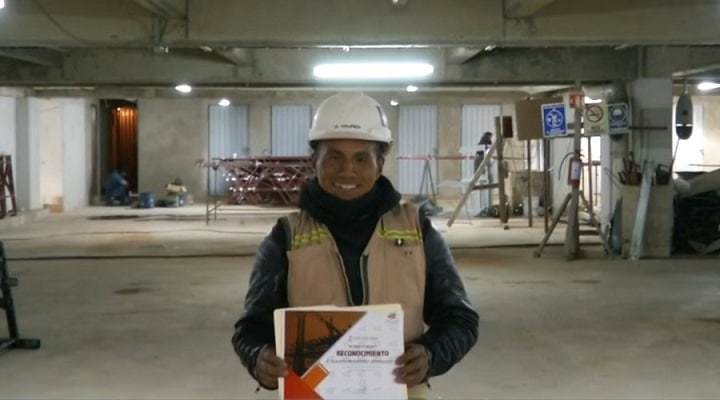Newsletter | Strong and Inclusive Workforces are Good Business

Newsletter from the Council for Inclusive Capitalism
The way we work is changing rapidly, and the evolving labor market can make jobs more challenging to fill. Swift technological breakthroughs enable companies and their employees to do more with less and with greater speed and efficacy. In the span of just three decades, we have seen the ideas of the future — global trade, robotic automation, generative artificial intelligence, remote work — become present strategies for companies.
Skills development is an essential part of long-term human capital management, and a means for advancing social equity. In times of industrial change, fully activating human talent is essential to meet market demand as worker roles incorporate new technologies and responsibilities. New jobs that don’t yet exist will be a necessity within the decade.
Companies that invest to deepen skill proficiencies in their workforce or to transition into new functions find a competitive market advantage. A McKinsey analysis of 1,800 large companies across sectors in 15 countries showed that companies that upskill or reskill workers achieve more consistent productivity and have greater earnings resilience. Workplace learning and opportunities for career advancement have positive impacts on employee retention. Deloitte in its 2023 Human Capital Trends insights finds that companies that organize work around skills rather than fixed job titles are better able to train and pivot rapidly to take advantage of market opportunities.
Businesses should also look to activate untapped talent reserves to meet their needs for skilled talent. The Council for Inclusive Capitalism is proud to co-host a learning webinar this month on second-chance hiring programs with the Second Chance Business Coalition. More on this below.
Our members are finding innovative ways to profitably solve workforce challenges in their organizations:
- RapiCredit is providing 10 hours of skills training and development to more than half of their full-time employees in 2023.
- EY is offering a free, employee-exclusive MBA degree program in association with Hult International Business School to all its employees to prepare them to navigate the technology, leadership and business challenges ahead.
- Ad Maiora allows employees to dedicate up to 20 percent of their work hours to upskilling programs that support their professional and personal growth.
- SkillLab, through their Just Skills Hub, offers workers affected by the green energy transition a digital tool to showcase their skills and prior learning and works with governments, employment services, and trade unions to create pathways to new employment.
- Merck and IBM are collaborating on the OneTen talent platform to hire, upskill, reskill, and promote one million Black people without four-year degrees into family-sustaining careers over the next 10 years.
Find these and more private and public sector actions to invest in the long-term value and fulfillment of workers on our action platform.
The Council for Inclusive Capitalism team and I invite you to join us and share the actions you are taking for a more diverse, equitable, and inclusive capitalism.

Lynn Forester de Rothschild
Founder and Co-Chair
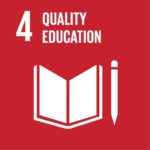
View 85 company actions to advance education for everyone.
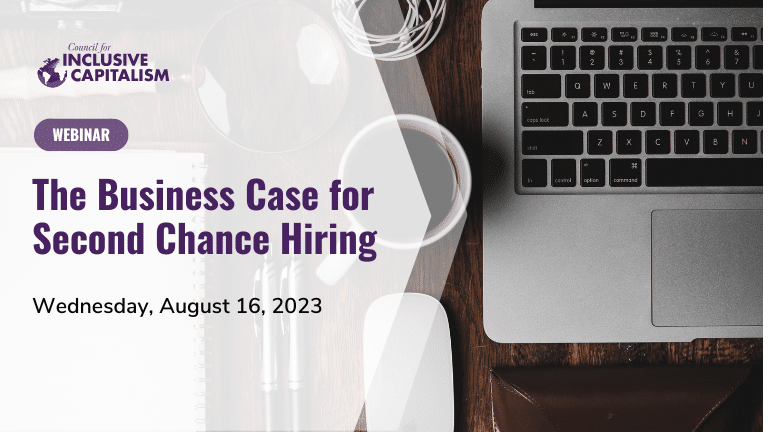
WEBINAR: THE BUSINESS CASE FOR SECOND CHANCE HIRING
Businesses struggle to fill jobs even as millions of talented Americans are excluded from workforce opportunity because of their criminal records. On Wednesday, August 16, join the Council for Inclusive Capitalism and the Second Chance Business Coalition (SCBC) for a webinar on the business case for hiring, retraining, and promoting “second chance” employees.
Jonay Foster Holkins, Senior Director of Policy and Corporate Initiatives at the Business Roundtable, and Monica Jackson, Vice President of Global Inclusion and Diversity at Eaton, will share how second chance hires have benefitted companies and offer practices others can take up.
DOES STAKEHOLDER ENGAGEMENT PRIORITIZE VALUES OVER VALUE?
 Council founder Lynn Forester de Rothschild and Council Steering Committee leader Ronald O’Hanley, CEO of State Street, joined GreenBiz Editorial Director Heather Clancy at GreenFin23 at the end of June to talk about the case for investor engagement as a strategy for climate change. She asked: Does working with a business to update its operations place an undue emphasis on values over company value creation? Hear Ron and Lynn’s responses on the GreenBiz 350 podcast.
Council founder Lynn Forester de Rothschild and Council Steering Committee leader Ronald O’Hanley, CEO of State Street, joined GreenBiz Editorial Director Heather Clancy at GreenFin23 at the end of June to talk about the case for investor engagement as a strategy for climate change. She asked: Does working with a business to update its operations place an undue emphasis on values over company value creation? Hear Ron and Lynn’s responses on the GreenBiz 350 podcast.
COMPANIES ACROSS THE GLOBE COMMIT TO STRONG WORKFORCE EDUCATION INITIATIVES
Council members strengthening their workforces and potential for value creation through a variety of strategies ranging from formal education to on-the-job training. Read on for examples of how a few Council members are taking action. Then, visit our action platform to explore nearly 200 more ways businesses are investing in the empowerment of people.
 IBM commits to providing 30 million people of all ages globally with skills needed for the jobs of tomorrow by 2030. The company has developed a roadmap with more than 170 new academic and industry partnerships. The effort will leverage IBM’s existing education programs and career building platforms to expand access to education and in-demand technical roles. IBM’s programs range from technical education for teens at brick-and-mortar public schools and universities, and extend to paid, on-site IBM internships and apprenticeships. The company’s skills and education programs also pair IBM mentorships with learners, and provide no-charge, customizable online curricula to aspiring professionals. The plan includes collaborations with universities and key government entities — including employment agencies. Partnerships extend to NGOs as well, particularly those that focus on groups such as underserved youth, women, and military veterans.
IBM commits to providing 30 million people of all ages globally with skills needed for the jobs of tomorrow by 2030. The company has developed a roadmap with more than 170 new academic and industry partnerships. The effort will leverage IBM’s existing education programs and career building platforms to expand access to education and in-demand technical roles. IBM’s programs range from technical education for teens at brick-and-mortar public schools and universities, and extend to paid, on-site IBM internships and apprenticeships. The company’s skills and education programs also pair IBM mentorships with learners, and provide no-charge, customizable online curricula to aspiring professionals. The plan includes collaborations with universities and key government entities — including employment agencies. Partnerships extend to NGOs as well, particularly those that focus on groups such as underserved youth, women, and military veterans.
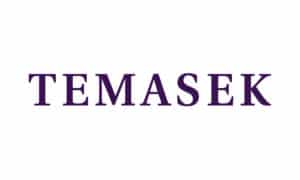 Temasek is committed to advancing the wellbeing of its employees and providing learning opportunities for upskilling and reskilling. The company offers a variety of resources for staff to grow their financial, physical, social, and emotional wellbeing beyond their work capacity. Temasek’s On-demand Learning program, offered in partnership with business schools and practitioners, offers staff the latest leadership and learning. They encourage staff to proactively broaden their skills in areas such as coding and data science, languages, music and dance, and offer a “CEO Challenge” program to track progress. As part of their annual disclosure exercise, Temasek publishes sustainability indicators relating to human capital, such as average training hours per employee.
Temasek is committed to advancing the wellbeing of its employees and providing learning opportunities for upskilling and reskilling. The company offers a variety of resources for staff to grow their financial, physical, social, and emotional wellbeing beyond their work capacity. Temasek’s On-demand Learning program, offered in partnership with business schools and practitioners, offers staff the latest leadership and learning. They encourage staff to proactively broaden their skills in areas such as coding and data science, languages, music and dance, and offer a “CEO Challenge” program to track progress. As part of their annual disclosure exercise, Temasek publishes sustainability indicators relating to human capital, such as average training hours per employee.
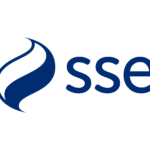 SSE is dedicated to helping workers with applicable skills find jobs in their transmission, renewables, and distributed energy operations. On their way to net zero emissions by 2050, SSE is one of the world’s leading companies on policies that protect workers and offer them a fair, smooth transition from high- to low-carbon jobs. One in five SSE employees today previously worked in high-carbon jobs. Recognizing the transferrable skills these workers have, SSE’s recruitment processes focus on skill and strengths-based criteria, rather than specific low-carbon experience. Hear one worker’s story of switching from offshore oil collection to wind generation.
SSE is dedicated to helping workers with applicable skills find jobs in their transmission, renewables, and distributed energy operations. On their way to net zero emissions by 2050, SSE is one of the world’s leading companies on policies that protect workers and offer them a fair, smooth transition from high- to low-carbon jobs. One in five SSE employees today previously worked in high-carbon jobs. Recognizing the transferrable skills these workers have, SSE’s recruitment processes focus on skill and strengths-based criteria, rather than specific low-carbon experience. Hear one worker’s story of switching from offshore oil collection to wind generation.
They are also helping those who may have taken breaks in their career to re-enter the workforce. The company’s STEM Returner program offers a 12-week paid retraining program to those with previous STEM experience who wish return to engineering mid-career.
🛠️ CONSTRUYENDO Y CRECIENDO MEETS WORKERS WHERE THEY ARE
Education non-profit Construyendo y Creciendo is closing education and personal development gaps for Mexico’s construction workers by bringing classrooms and training to their job worksites. Working with site supervisors, they set up semi-permanent classrooms in and around the buildings under construction to provide computers, internet access, and other learning materials to workers who attend lessons before or after their shifts.
They offer traditional education at primary and secondary education levels, with a particular focus on literacy. These lessons are supplemented with job skills training in masonry, plumbing and electricity, computer skills training, and health and financial education. When COVID-19 made it unsafe to host indoor classroom activities, Contruyendo y Creciendo pivoted to offer remote learning options. They plan to make the online-only modules a permanent offering to continue educational benefits to workers who cannot finish their curriculum before a classroom is closed at the completion of a construction project.
Over the last 14 years, the organization has collaborated with 80 development and construction companies to reach more than 25,000 workers in 16 Mexican states.

![]() Re:Coded helps underserved talent build careers in the digital economy
Re:Coded helps underserved talent build careers in the digital economy
“Talent is everywhere, opportunity is not.” While technological advances have created unparalleled opportunities for many, underserved populations still face systemic barriers in accessing quality education, training, and job opportunities required to improve their economic and social mobility in a changing landscape. Re:Coded offers free full-time bootcamps in software engineering skills and part-time courses on code and soft skills to help students across the Middle East, North Africa, and Türkiye prepare for successful tech careers. Nearly 6,000 students applied for programs last year.
“While we know that our programs have a wide-ranging impact on our students, employment is ultimately the key metric of success for us,” the directors write in the company’s 2022 annual report. “While we have maintained an employment rate of over 90%, we are looking to strengthen our approach with a greater focus on connecting our students to industry professionals through mentorship and continuing to build more employment partnerships.”

BRIDGING THE GAP FOR SUSTAINABLE HOMEOWNERSHIP WITH NEXT STEP NETWORK
Stacey Epperson, President and CEO of Next Step Network, is focused on the positive economic impact that high-quality, energy-efficient manufactured housing can have for families. In a new audio-interivew with the Council for Inclusive Capitalism, she shares how she is working to build relationships between the factory-built housing industry, housing developers, affordable housing advocates, lenders, and other key stakeholders to deliver climate resilient factory-built homes as a viable, sustainable homeownership solution.
Q: Tell us about why Next Step Network wants to help create a more inclusive housing market.
A: Next Step believes that owning your own home is part of the American dream. It lifts people out of poverty or helps them break generational poverty. But not everyone’s benefiting right now. In fact, the U.S. homeownership market has failed, and continues to fail, many households across the country.
Owning your home still remains one of the best determinants of wealth creation and equity building for a family. It may help you put your child through college, like it did for me. Once you start building equity, you have an asset. Yet there are millions of households, particularly communities of color and low income communities, that have really been barred from homeownership. The lack of affordable housing and a legacy of exclusionary housing policies have made it difficult for some of these communities to buy their first home. Couple this with a national supply gap in housing and what you have is a really difficult, unfair situation.
Q: We know climate change is affecting nearly every industry and community. How is Next Step Network addressing this?
A: Climate change is and will continue to reshape our communities and our planet. And so part of our mission is rooted in the belief that we need not only to support households by lowering their utility and energy costs, but also as being really good stewards of the environment. All of our new homes will be all-electric, with efficient heating and cooling systems. We’re also interested in testing more solar-powered manufactured homes with the goal of getting to net zero in our own process.
![]() New resources from Council Members
New resources from Council Members
- We Mean Business Coalition launches a just transition resource platform to connect leaders to dozens of the best tools to navigate their just transition journey.
- Rethinking Capital provides guidance for accounting the benefits of net-zero transition as intangible assets in company balance sheets.
- OECD launches the Impact Management Platform to clarify and build interoperability among various methods for measuring and managing company impact.
![]() Welcome New Council Members
Welcome New Council Members
Steve Smykal
Founder, 1 World Sustainability
Md. Moniruzzman
Executive Director, Aid Organization Bangladesh
Edoardo Alfinito
CEO, Ambra
Maksudur Rahman
Chief Executive, Bangladesh Environment and Development Society (BEDS)
Phil Bloomer
Executive Director, Business and Human Rights Resource Centre
Bruce Freed
President, Center for Political Accountability
Bernard Mohr
Chair and President, Co-Creating Mutual Value Collaborative
Alexei Levene
Co-Founder and Chief Commercial Officer, Desolenator
David Mozersky
President, Energy Peace Partners
Ajmal Shirzai
Country Director, Future Generations Afghanistan (FGA)
Kenneth Kwok
Founder, Global Citizen Capital
Muhammad Ikram
CEO, Hape Development and Welfare Association
Ghulam Abass
Executive Director, Integrated Rural Awareness & Development Organization (IRADO)
Olivier Brechard
Director, LearningPlanet International Alliance
Monica Vigues-Pitan
CEO, Legal Services of Greater Miami, Inc.
Simon Schmid
Director, Just Skills Hub – SkillLab
Binoy Meghraj
Vice Chairman and Managing Director, Meghraj Group
Yasmina McCarty
CEO, New Growth Innovation Network
Jeff Cherry
CEO, Novella Center for Entrepreneurship
Kayemba Mvula
Founder and CEO, Pivot LLC
Marco Ribeiro Henriques
CEO, RESHAPE
Reema Nanavaty
General Secretary, Self-Employed Women’s Association (SEWA)
Jeffrey Bill
Founder and CEO, Sunrise Treatment Center
Khalil Osiris
Founder, Truth & Reconciliation Conversations (TRC)
Jochem Bossenbroek
Co-Founder and CEO, Verdify
![]() Inclusive Capitalism in the News
Inclusive Capitalism in the News
ESG Today | Deloitte, Salesforce, AT&T collaborate on IoT-powered ESG data management solution
Responsible Investor | Caroline Rees, Shift, and Namit Agarwal, World Benchmarking Alliance: How the ISSB should incorporate social issues in sustainability reporting
GreenBiz.com | Marc Benioff: Salesforce goes ‘nature positive’
GreenBiz.com | Ron O’Hanley, State Street: What to talk about when you don’t talk about ESG
Vault.com | Council for Inclusive Capitalism legal advisers McDermott Will & Emery ranks among top ten Best Law Firms for Diversity

